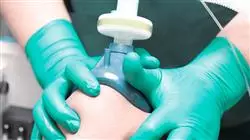University certificate
The world's largest faculty of nursing”
Introduction to the Program
Don't be just another nurse. Make your resume stand out and access positions with higher salary projection, being able to work in different countries thanks to your proficiency and fluency in English”

English has become practically the universal language. As such, people of all races, professions and ages must know this language if they want to reach the top in the jobs they perform. Nursing is not exempt from this reality and the most prestigious hospitals worldwide demand professionals with the ability to work in Shakespeare's native language.
The need for this new competency profile is based on the continuous scientific and health development that humanity has experienced in recent decades, as well as on globalization, which has motivated and facilitated the mobility of people, whether for work, tourism or health issues to different countries around the world.
In this way, it becomes absolutely necessary for nurses to have the ability to communicate in a second language, and the most accepted one is English, whether they are engaged in research or work in healthcare institutions. Only in this way will they be able to meet the current needs of their field of action, whether in their home country or in another country where they have decided to carry out their professional practice.
Additionally, language proficiency in English gives the nurse the ability to deal and communicate well with doctors, colleagues and patients of other nationalities and backgrounds. One more reason why the professional should not miss this opportunity and acquire the best communication skills in English with this Master's Degree.
All this, condensed in a 100% online program, with an eminently practical orientation, where the most competent teachers will teach the nurse the best techniques and tools to not only communicate in English, but to certify the B2 based on the requirements of the Common European Framework of Reference for Languages (CEFR).
Surpass yourself by becoming a nurse capable of caring for your patients in the most widely used language in the world: English"
This Master's Degree in English for Nursing contains the most complete and up-to-date scientific program on the market. The most important features include:
- The development of practical case studies, presented by experts in language teaching, applied to professional practice
- The eminently practical content of the course provides practical and useful information on those techniques that are essential for using English in professional contexts
- Exercises where the self-assessment process can be carried out to improve learning
- Its special emphasis on innovative methodologies
- Theoretical sessions, questions to the expert, discussion forums and individual reflection assignments
- Content that is accessible from any fixed or portable device with an Internet connection
Whether you're going into research, healthcare or even senior management, English proficiency will be basic to your professional growth"
The program’s teaching staff includes professionals from the sector who contribute their work experience to this training program, as well as renowned specialists from leading societies and prestigious universities.
The multimedia content, developed with the latest educational technology, will provide professionals with situated and contextual learning, i.e., a simulated environment that will provide immersive training, designed for training oneself in real situations.
This program is designed around Problem-Based Learning, whereby the professional must try to solve the different professional practice situations that arise throughout the program. For this purpose, the student will be assisted by an innovative interactive video system created by renowned and experienced experts.
TECH's language teaching methodology will allow you to acquire knowledge of English grammar, semantics and syntax, and best of all, it will allow you to put what you learn into practice.

Not only will you know how to speak fluent English in your professional context, but you will also be able to certify B2 based on CEFR requirements.
Why study at TECH?
TECH is the world’s largest online university. With an impressive catalog of more than 14,000 university programs available in 11 languages, it is positioned as a leader in employability, with a 99% job placement rate. In addition, it relies on an enormous faculty of more than 6,000 professors of the highest international renown.

Study at the world's largest online university and guarantee your professional success. The future starts at TECH”
The world’s best online university according to FORBES
The prestigious Forbes magazine, specialized in business and finance, has highlighted TECH as “the world's best online university” This is what they have recently stated in an article in their digital edition in which they echo the success story of this institution, “thanks to the academic offer it provides, the selection of its teaching staff, and an innovative learning method aimed at educating the professionals of the future”
A revolutionary study method, a cutting-edge faculty and a practical focus: the key to TECH's success.
The most complete study plans on the university scene
TECH offers the most complete study plans on the university scene, with syllabuses that cover fundamental concepts and, at the same time, the main scientific advances in their specific scientific areas. In addition, these programs are continuously being updated to guarantee students the academic vanguard and the most in-demand professional skills. In this way, the university's qualifications provide its graduates with a significant advantage to propel their careers to success.
TECH offers the most comprehensive and intensive study plans on the current university scene.
A world-class teaching staff
TECH's teaching staff is made up of more than 6,000 professors with the highest international recognition. Professors, researchers and top executives of multinational companies, including Isaiah Covington, performance coach of the Boston Celtics; Magda Romanska, principal investigator at Harvard MetaLAB; Ignacio Wistumba, chairman of the department of translational molecular pathology at MD Anderson Cancer Center; and D.W. Pine, creative director of TIME magazine, among others.
Internationally renowned experts, specialized in different branches of Health, Technology, Communication and Business, form part of the TECH faculty.
A unique learning method
TECH is the first university to use Relearning in all its programs. It is the best online learning methodology, accredited with international teaching quality certifications, provided by prestigious educational agencies. In addition, this disruptive educational model is complemented with the “Case Method”, thereby setting up a unique online teaching strategy. Innovative teaching resources are also implemented, including detailed videos, infographics and interactive summaries.
TECH combines Relearning and the Case Method in all its university programs to guarantee excellent theoretical and practical learning, studying whenever and wherever you want.
The world's largest online university
TECH is the world’s largest online university. We are the largest educational institution, with the best and widest online educational catalog, one hundred percent online and covering the vast majority of areas of knowledge. We offer a large selection of our own degrees and accredited online undergraduate and postgraduate degrees. In total, more than 14,000 university degrees, in eleven different languages, make us the largest educational largest in the world.
TECH has the world's most extensive catalog of academic and official programs, available in more than 11 languages.
Google Premier Partner
The American technology giant has awarded TECH the Google Google Premier Partner badge. This award, which is only available to 3% of the world's companies, highlights the efficient, flexible and tailored experience that this university provides to students. The recognition as a Google Premier Partner not only accredits the maximum rigor, performance and investment in TECH's digital infrastructures, but also places this university as one of the world's leading technology companies.
Google has positioned TECH in the top 3% of the world's most important technology companies by awarding it its Google Premier Partner badge.
The official online university of the NBA
TECH is the official online university of the NBA. Thanks to our agreement with the biggest league in basketball, we offer our students exclusive university programs, as well as a wide variety of educational resources focused on the business of the league and other areas of the sports industry. Each program is made up of a uniquely designed syllabus and features exceptional guest hosts: professionals with a distinguished sports background who will offer their expertise on the most relevant topics.
TECH has been selected by the NBA, the world's top basketball league, as its official online university.
The top-rated university by its students
Students have positioned TECH as the world's top-rated university on the main review websites, with a highest rating of 4.9 out of 5, obtained from more than 1,000 reviews. These results consolidate TECH as the benchmark university institution at an international level, reflecting the excellence and positive impact of its educational model.” reflecting the excellence and positive impact of its educational model.”
TECH is the world’s top-rated university by its students.
Leaders in employability
TECH has managed to become the leading university in employability. 99% of its students obtain jobs in the academic field they have studied, within one year of completing any of the university's programs. A similar number achieve immediate career enhancement. All this thanks to a study methodology that bases its effectiveness on the acquisition of practical skills, which are absolutely necessary for professional development.
99% of TECH graduates find a job within a year of completing their studies.
Master's Degree in English for Nursing
Globalization and geographical mobility have made English the lingua franca of science and technology, including Medicine and Nursing. In this context, having great language skills is essential to develop an international career and be at the forefront of the latest trends and advances in the field of Health. Motivated by this, this academic institution has created the Master's Degree in English for Nursing, with the intention of perfecting your skills in this language and favoring your performance both in the care of Anglo-Saxon patients and in the field of research.
Perfect your English 100% online
Do you want to master the most advanced English vocabulary and communicative structures in relation to aspects such as medical data collection, specialties, medical equipment or patient care? TECH has the solution! Acquire with this Master's Degree in English for Nursing excellent English skills and grow professionally in the international healthcare field. Moreover, you will achieve it in only 12 months and enjoy complete teaching materials available in formats such as the explanatory video or the interactive summary.







